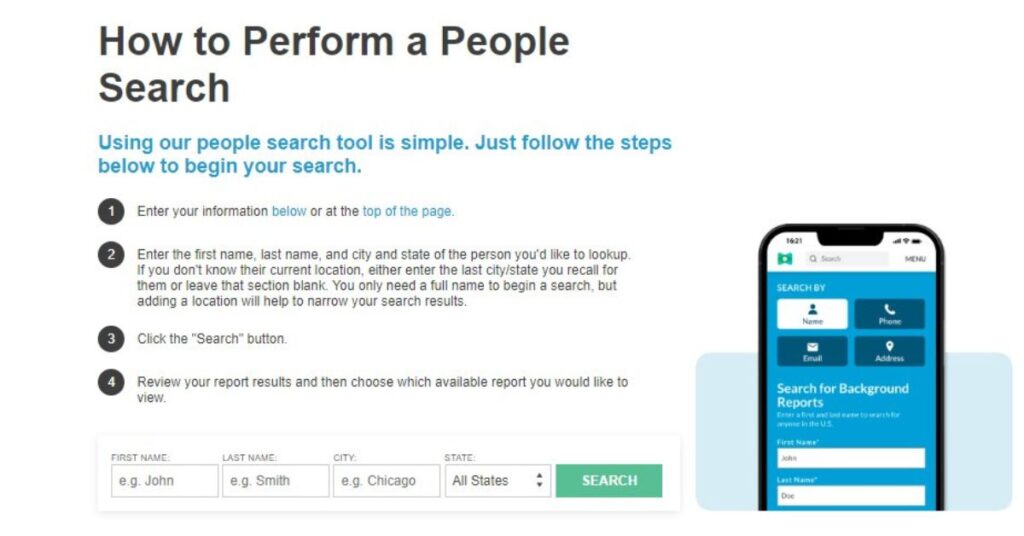Overview
Are you longing to find the missing piece of your identity, your biological father? The burning desire to know where you come from and the need to connect with your roots is a powerful force.
You might ask, but how to find my dad when so little information is available? Fear not, because in this comprehensive guide, we will unlock the secrets of using TruthFinder, a powerful tool, and other methods that can help you find your dad and reunite with your true heritage.
It’s time to unravel the mystery, uncover the truth, and embrace the journey that will forever change your life. Get ready to embark on a quest like no other.
The Basics Of TruthFinder

Understanding the features and capabilities of TruthFinder opens up a world of possibilities in your quest to find your dad.
This powerful platform harnesses the vast resources of public records, social media, and more and can provide comprehensive information and leads.
With TruthFinder, you can uncover crucial details even if you only have your father’s name and other limited information, like the place where he lived.
Exploring how the platform aids in the search for your dad is like opening a treasure trove of information.
TruthFinder employs advanced algorithms and data analysis techniques to cross-reference various databases and sources, including marriage records, birth certificates, social media, criminal records, etc.
By accessing this vast array of information, you can piece together fragments of your father’s life and potentially uncover his current whereabouts.
Begin by entering any known information about your father, such as his name, last known location, or age range.
TruthFinder will then initiate a comprehensive search, scouring its extensive database to generate a detailed report.
This report may include contact information, social media profiles, addresses, and even associates or relatives connected to your dad.
You can start narrowing down your search by thoroughly analyzing the information provided and making meaningful progress.
To use TruthFinder effectively, follow this step-by-step guide.
How To Find My Dad Using TruthFinder: A Step-By-Step Guide
Here’s a step-by-step summary of how to find your dad using TruthFinder:
- Gather Information: Start by writing down everything you know about your father and your family history. This includes his full name, the city and state he last lived in, and his age. If you have limited information, use your birth certificate or consult family members for additional details.
- Use TruthFinder’s People Search: Enter your father’s first and last name into TruthFinder’s people search engine. To narrow down the results, consider adding his middle initial, city, and state.
- Review the Matches: TruthFinder will provide a list of individuals in its database who match the information you provided. Look for potential matches that closely resemble your father.
- Explore the Person Report: Click on the match that seems most relevant to access the Person Report. This report can provide valuable information about your biological father, including known aliases, addresses (both past and current), contact information such as phone numbers and email addresses, possible relatives, criminal history, social media profiles, and additional data like weapons permits, businesses, professional licenses, assets, and bankruptcies.
- Utilize Possible Relatives: Pay attention to the “Possible Relatives” section in the Person Report, as it can lead you to other individuals connected to your father, such as friends, roommates, business associates, and neighbors. Click on their names to access their respective Person Reports for further investigation.
- Explore Alternative Connections: If you don’t have much information about your father, try searching for your mother’s name. Your father might be listed as a possible relative in her report. Additionally, consider searching for yourself and any known siblings or other relatives in your biological family, as they may provide leads to your father.
- Reverse Phone Lookup: Can I track my dad’s phone number? If you have any old phone numbers associated with your father, use TruthFinder’s reverse phone number lookup feature. Enter the number to see if it provides any information or connections to your father.
Remember, the search process may require multiple reports and additional investigation. Stay persistent and open-minded, and make use of the resources provided by TruthFinder.

To find out more about this “Find My Dad Tracker,” read Is TruthFinder Worth The Money? A Comprehensive Review 2023.
Exploring Alternative Methods

DNA Testing: Leveraging Genetic Information To Find Your Father
When the traditional approach yields limited results, alternative methods can become invaluable in your pursuit of finding your dad. DNA testing, for instance, offers a groundbreaking solution.
By leveraging genetic information, you can potentially uncover your biological father’s identity even without his name.
DNA testing services such as AncestryDNA, 23andMe, and MyHeritage provide DNA-matching features that can help connect you with potential biological relatives, leading you closer to your father.
Submit to as many databases as possible to increase your match chances.
Utilizing Find My Dad Apps And Online Resources
Utilizing “find my dad apps” and online resources can also be a game-changer. These innovative platforms cater specifically to familial searches, helping you navigate the complex web of relationships and find the missing link in your life.
Apps and websites like FamilySearch, Find My Family Magazine, or Adoption.com provide tools, resources, and support to aid you on your journey. Maximize their effectiveness by following tips and strategies such as reaching out to online communities, sharing your story, and exploring their vast databases.
Searching Without DNA: Methods To Find Your Dad When DNA Testing Is Not An Option
When a DNA test to find father is not an option, you can still find your dad by utilizing public records, social media, and online communities.
Public records, such as birth records, marriage certificates, or court documents, may contain vital information that can lead you closer to your father’s identity. Tools that aggregate and sort such information, like TruthFinder, can prove valuable.
Additionally, social media platforms can serve as a powerful tool for tracking down individuals, especially if your father has an online presence. Engaging with online communities dedicated to familial searches can also provide guidance, resources, and potential leads.
Using AI And Facial Recognition Tools

Using AI tools like facial recognition technology can be a powerful resource in searching for your father, especially if other options are unavailable.
With advancements in artificial intelligence, these tools have become increasingly accurate in analyzing facial features and matching them to potential matches in large databases.
By providing a photograph of any available pictures of your father, facial recognition algorithms can compare facial characteristics and potentially identify individuals who bear a resemblance.
This technology offers a streamlined and efficient approach to narrowing down potential candidates, saving you time and effort in your search. However, it’s important to note that while AI tools can provide valuable leads, they should be used in conjunction with other investigative methods to ensure the highest level of accuracy.
Human verification and thorough investigation remain vital to confirm any matches and establish a genuine connection with your father.
Several companies provide facial recognition tools designed to help find individuals on the internet. These tools utilize sophisticated algorithms to analyze facial features and compare them against extensive databases of images sourced from various online platforms.
By inputting a photograph or uploading an image of the person you are searching for, these tools can scan the internet for potential matches based on facial similarity.
Hiring A Private Investigator
Hiring a private investigator or collaborating with professional genealogists is sometimes necessary. These experts possess the knowledge, expertise, and access to specialized databases to expedite your search and provide valuable insights.
With their help, you can navigate the intricacies of family history, trace lineage, and potentially locate your father.
Finding your dad may seem like an impossible challenge. Still, by combining the power of TruthFinder, alternative methods like DNA testing and other find my dad apps, plus the vast resources of public records and online communities, you can embark on a journey that holds the promise of reconnection, self-discovery, and a deeper understanding of your own identity.
Don’t let limited information deter you; with determination, patience, and the right tools at your disposal, you can uncover the truth and find the father you never met.
Dealing With Challenging Circumstances

When My Mother Doesn’t Know Who My Father Is
Discovering that your mother doesn’t know who your father is can be an emotionally charged situation. Sensitivity and open communication are key in navigating this delicate matter.
Approach your mother with understanding, acknowledging the potential sensitivity of the topic. Communicate your desire to learn more about your biological father, expressing your need for identity and connection.
While your mother may not have explicit information, she might provide subtle clues or anecdotes that can aid in your search. Remember to respect her feelings and boundaries throughout the conversation.
To uncover potential leads, explore additional avenues of investigation. Reach out to extended family members, close friends, or anyone who might have information about your father.
Sometimes, family secrets can be inadvertently revealed through casual conversations or shared memories. Piecing together these fragments can lead you closer to the truth.
Additionally, consider searching through old photographs, letters, or personal belongings that might hold hidden clues about your father’s identity. Be persistent and creative in your search, leaving no stone unturned.

Should I Find My Biological Father? Considerations And Emotional Impact
Deciding whether to embark on the journey to find your biological father is a deeply personal choice, fraught with emotional considerations. Weighing the pros and cons is crucial to ensure you are prepared for the potential outcomes and impact.
On the one hand, discovering your biological father can offer a sense of closure, validation, and a connection to your heritage. It may provide answers to long-standing questions about your identity and family history.
On the other hand, the process can be emotionally challenging, and the outcomes may not always align with your expectations.
Coping with potential emotional outcomes and expectations is an essential part of this journey. Understand that the image you have constructed of your father might differ from reality.
Managing your expectations can help protect your emotional well-being and prevent potential disappointment.
It’s important to acknowledge that the search for your biological father may lead to complex familial dynamics, including unexpected relationships, strained reunions, or even rejection.
Seeking support from trusted friends, family, or therapists can provide a safe space to process and navigate the emotional impact of these outcomes.
The Effects Of Not Knowing Your Biological Father

Psychological And Emotional Impact Of Paternal Absence
The absence of knowing your biological father can have profound psychological and emotional effects throughout your life. It can create a sense of identity void, leaving unanswered questions about where you come from and who you are.
This void can manifest as a persistent longing for connection and a desire to fill the gaps in your personal history. Understanding the importance of identity and heritage becomes crucial in navigating these challenges.
Understanding The Importance Of Identity And Heritage
Identity is intricately tied to knowing your roots, understanding your heritage, and feeling a sense of belonging. Not having this information can create feelings of disconnection, confusion, and a lack of self-assurance.
It’s important to recognize that your biological father does not solely define your identity. However, exploring and embracing your heritage can contribute to a deeper understanding of yourself and your place in the world.
Navigating The Challenges Of Familial Relationships Without Knowing Your Father
Navigating familial relationships without knowing your father can be challenging. The absence of paternal influence may impact your perception of family dynamics and the formation of your own relationships.
It’s crucial to be mindful of any feelings of resentment, abandonment, or unresolved emotions that may arise. Seeking support through therapy, counseling, or support groups can provide a space to work through these challenges and develop healthy coping strategies.
While not knowing your biological father can present significant hurdles, it’s important to remember that you have the power to shape your own narrative. Embrace your journey of self-discovery, celebrate the strengths and resilience you have developed, and seek out connections that enrich your life.
What To Do When You Find Your Biological Father

Preparing Emotionally For The Reunion
Discovering your biological father can trigger a wide range of emotions, from excitement and anticipation to anxiety and apprehension. It’s crucial to prepare yourself emotionally for the reunion.
Allow yourself time to process the news and acknowledge any unresolved emotions that may arise. Consider seeking support from friends, family, or professionals who can provide a safe space to discuss your feelings and concerns.
Practicing self-care, engaging in stress-reducing activities, and maintaining realistic expectations can help you navigate the emotional rollercoaster that comes with reconnecting with your father.
Building A Relationship With Your Newfound Father
Once you have found your biological father, building a relationship requires time, patience, and open communication. Understand that both of you may have different expectations, experiences, and emotional baggage.
Take the time to get to know each other, sharing stories, interests, and experiences. Building trust and establishing boundaries is essential, as it allows the relationship to grow naturally.
It’s important to manage your expectations and recognize that the process of building a relationship takes time. Be open, understanding, and compassionate as you navigate the complexities that come with newfound family connections.
Exploring Potential Legal Considerations And Familial Dynamics
As you embark on the journey of reconnecting with your biological father, it’s important to explore potential legal considerations and familial dynamics.
Depending on the circumstances, legal processes may be considered, such as establishing paternity, updating legal documents, or addressing inheritance matters. Seeking legal advice can clarify and ensure you navigate these considerations properly.
Familial dynamics may also come into play. It’s important to understand that your newfound father may have an existing family or other relationships. Navigating these dynamics requires sensitivity, respect, and open communication.
Every family is unique, and finding a balance that works for all parties involved is crucial. Embrace the opportunity to expand your family connections, learn from each other, and foster understanding as you integrate into each other’s lives.
Finding your biological father can be a life-altering experience, filled with challenges, emotions, and the potential for growth and connection.
By considering legal and ethical considerations, utilizing advanced techniques responsibly, preparing emotionally for the reunion, building a relationship with your newfound father, and exploring legal and familial dynamics, you can embark on this transformative journey with confidence, compassion, and the potential for a deeper understanding of your own identity and heritage.

Conclusion
As we reach the end of this transformative journey, remember that finding your biological father is not just about discovering a name or filling a void.
It’s about unearthing your true identity, connecting the pieces of your puzzle, and understanding the profound impact that knowing your roots can have on your life.
Whether you use TruthFinder, DNA testing, or alternative methods, know that the path may be challenging, but the rewards are immeasurable. Embrace the emotions, be prepared for the unexpected, and cherish every step along the way.
Remember, you are not alone in this search; a whole world of support and understanding might be waiting for you. So, go forth, my friend, and find your biological father – the missing link to your story. Your journey starts now.
To find out more about TruthFinder pricing, features, and everything else, read our TruthFinder Reviews: Great Or Not, What Users Say In 2023
All product names, logos, brands, trademarks and registered trademarks are property of their respective owners.


